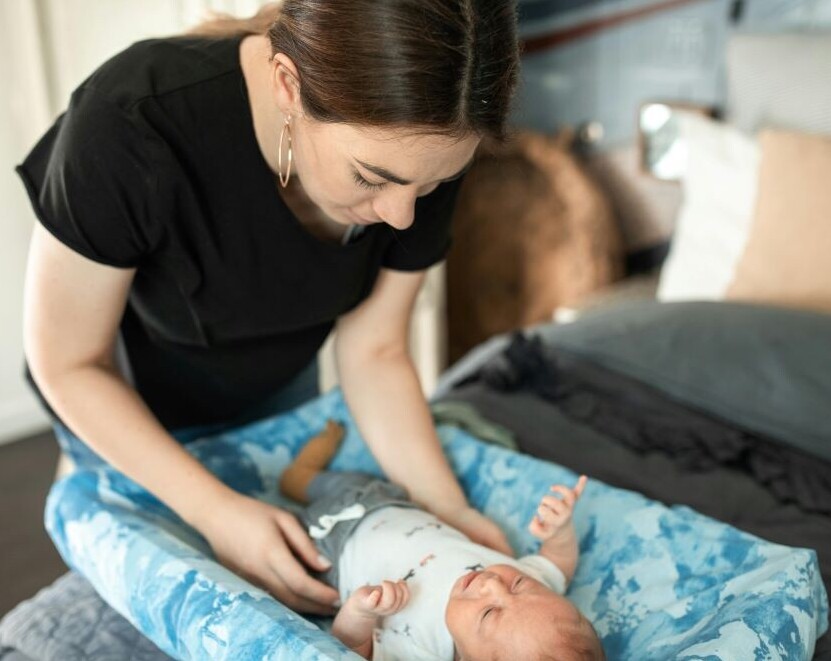
Autonomy in Child Development
An infant has little autonomy. We have to do everything for her. One of the first things she learns is to make her needs known. During the first three months, this is done through crying. The infant soon learns that crying inspires others to meet her basic needs, and with that realization, she enters the social world. The skills that emerge in the next three months extend her ability to negotiate this new world. Human beings are social creatures, and if the infant is to survive and develop, she will do that through social interaction.
Developmental Milestones Categories
The cognitive milestone skills your child will be developing are grouped into categories of time. This blog discusses the category, 4-6 months. We will discuss all the areas of development (cognitive, language, social/emotional, and physical) that occur during these months.
Infant Cognitive Developmental Milestones
This blog accepts the definition of infancy as birth to 1 year. However, the first year in your child’s life is a time of rapid and dynamic change. Your child’s skill set will significantly change about every 3 months of this first year.
Around the fourth month, your child will begin to develop cognitive skills that are important for her emotional, social, and language development. Remember, your child’s development involves the emergence of skills across the five domains of development (cognitive, language, social/emotional, and physical). These skills emerge simultaneously but they support one another. When you provide your child opportunities to develop skills in one skill set, you automatically provide development in the other skill sets.
One such important skill is recognizing familiar faces. This skill is important for later social development. The infant’s social world is divided into familiar people and strangers. By recognizing faces with whom she has had past experiences, your child is beginning to build her social world. She is beginning to construct the category of people with whom she has had past experiences. Alongside the construction of this category will emerge that of strangers. Experiences with others is important at this phase of your child’s cognitive development. Categories are the basis of cognition and these two categories are two of the first he will develop. Thus, positive interactions with others are important. Negative interactions will produce anxiety and fear in your child. These negative emotional responses will interfere with your child’s learning.

Social Emotional Milestones Early Childhood
About the fourth month your child will begin to exhibit skills that will support his later social development. People’s faces will become more important. Your child found your eyes important at birth. When you looked at her, she would fixate on your eyes. Now, she is interested in other aspects of not only your face but those of others. Human’s have developed facial muscles that make that part of their bodies centers of communication and expression. Over the coming years, the 4-month old infant will learn to recognize many subtle expressions of emotions through facial expressions. Thus, giving your child opportunities to visually explore your face and a variety of facial expressions is important for his cognitive development at this stage.
Along with recognizing a variety of facial expressions, your child will begin to distinguish a variety of vocal tones. Your child has likely responded to your happy and sad faces. She will now incorporate an expressive dimension of your voice to those visual features. To your happy face, she will include happy sounds of your voice. Your child is now beginning to integrate different sensory modalities. It is from this integration that your child will begin to construct symbols. Thus, experiences of looking at your face and listening to your speech are important for the enrichment of this development. It is from these pre-language experiences that your child’s language development will draw.
Of course, it is through play that children learn. In my opinion, the primary way children interact with their environment is through play. It is the routines of play that best allow children to explore and discover all the possibilities of their environment. One of the most engaging aspects of the child’s environment are other people. Most objects in their environment are not interactive, people are. During the fourth to sixth months, your child will discover the social nature of her human environment. He will begin the mastery of human interaction, a process that will continue throughout his life. At first, your child’s play will be very simple, because there are many things happening in play that your child is trying to apprehend. In play, language is being spoken, emotions are being expressed, and motor patterns are occurring. All of these convey information that your child is trying to grasp. This early play is very important to help your child build a strong foundation for later language, social, and emotional skills.

Language Development Milestones Infants
At 4-6 months, speech development is focused on making a variety of sounds which will soon become the vowel and consonant sounds from which the sounds of our language are derived. To learn to say words, your child must first learn to make sounds. Along with this early speech are pre-language skills. This process had started in the first three months of your child’s life and continues. Your child’s motivation for mastering speech is the set of emerging skills we call language. Your child’s discrimination of her environment lends itself to the cognitive process of categorization that is rapidly developing in her cognitive skill set. She distinguishes between people and objects. By distinguishing familiar people from unfamiliar people she develops the concepts of “mommy” and “daddy.” From listening to you say these words, she begins to distinguish the initial sounds and is soon saying them. Quickly, she attaches the sounds to specific people who are very familiar to her. Her language, cognitive, and speech development will allow her to apply these categories to her environment and begin to make sense of it.

Movement Development Milestones
To develop all these skills, your child must have physical access to his environment. Physical skills are as critical as cognitive, language, and social/emotional skills. To develop, your child must move. You can help your child to develop movement skills by putting her in situations that afford her the movements she needs. In the first three months, your child began to move her eyes and head. In the coming months these skills will continue to develop, and your child will add those of pushing up with her arms when on her tummy and rolling over. You child needs some time each day out of a device in which she is strapped on her back. This is the stage of tummy time. Free on the floor, your child will begin to feel with her whole body the environmental space she has been seeing as she has gained control of her eye movements. Tummy time requires close supervision. Remember, your child does not yet even have full control of her head movements.
The other important movement skill during these months is that of reaching for objects and people. This skill requires your child to learn to extend his arms as well as coordinate his eye and hand movements. Having reached for an object and touched it, your child will have to learn to grasp it. Your child’s exploration of her environment was during the first three months merely visual. Everything had to be brought to her. Now, he will learn to physically access his environment himself. This access will support further development in the other skill areas.
Infant Development Activities
During the first three months, helping your child develop involves doing things for him. In the second three months, helping your child means interacting with her. For example, putting your child on her tummy is not sufficient to help her push with her arms and move her head. She needs another human being there talking to her and showing her different objects in her environment. Putting your child on a mat and surrounding her with toys will not motivate her to reach for those toys and try to grasp them. You can give her toys that squeak but she doesn’t not know they squeak and doesn’t know how to make them squeak. Your child’s development in this phase requires your interaction with her.